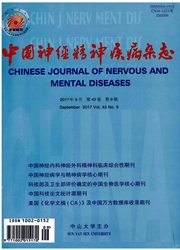

 中文摘要:
中文摘要:
目的编制脑外伤患者心灵理论家属评定量表,并对量表进行信效度检验。方法以196例脑外伤患者和80名正常成年人为被试,参考相关文献,结合定性访谈和专家组意见,形成初始量表。采用项目分析、因素分析筛选条目。检验量表的内部一致性、分半信度、重测信度、观察者信度。比较脑外伤患者和正常人的得分,检验量表的区分效度;采用目前心灵理论研究常用的错误信念任务、解释性心灵理论任务、失言识别任务作为金标准,检验量表的校标效度。结果最终的脑外伤患者心灵理论家属评定量表包含44个条目,总体克朗巴赫α系数为0.98,分半信度为0.87,重测信度为0.88,观察者信度为0.93。因素分析的结果与编制时的构想一致,共抽取出人际交往、信念理解、情感理解3个因素,可以解释方差的74.04%。量表总分能有效区分脑外伤患者和正常人[(110.44±30.94)vs(147.05±26.80),P〈0.01)。病例组和对照组中量表总分与错误信念任务、解释性心灵理论任务、失言识别任务的总分均明显相关(r=0.86,P〈0.01;r=0.89,P〈0.01)。结论脑外伤患者心灵理论家属评定量表具有较好的信度和效度。
 英文摘要:
英文摘要:
Objective To develop a family evaluation scale on theory of mind in traumatic brain injury patients and test its reliability and validity.Method One hundred ninety-six traumatic brain injury patients and 80 normal adults were recruited in the present study.The preliminary scale was established through reviewing the related literature,qualitatively interviewing with family members and fully discussing among experts.The item analysis,factor analysis were used to choose the items and form the formal scale.The internal consistency reliability,the split-half reliability,the test-retest reliability,and the interobserver reliability were then tested.The discriminate validity was tested by comparing the scores between the patients and the normal adults.Three present popular used theory of mind assessment tools(e.g.,the false believe task,the interpretation task and faux pas task) were used as gold standard to test the criterion-related validity.Results A 44 items theory of mind watcher evaluation scale of traumatic brain injury patients was formed.The Cronbach alpha coefficient of the scale,split-half reliability,the test-retest correlation and the interobserver reliability were 0.98,0.87,0.88 and 0.93,respectivelly.The results of factor analysis were consistent with the design philosophy.Three factors including personal interaction,belief understand,and affect understand were extracted and they could explain 74.04% of the total variance.The total scores of the scale were positively correlated with the total scores of the false believe task,the interpretation task and faux pas task in the patient group(r = 0.86,P 0.01) and in the control group(r = 0.89,P 0.01).There was significant difference between brain injury patients and normal adults in the summary scores of the scale[(110.44 ± 30.94) vs(147.05 ± 26.80),P 0.01).Conclusion The watcher evaluation scale of theory of mind for traumatic brain injury patients has good reliability and validity.
 同期刊论文项目
同期刊论文项目
 同项目期刊论文
同项目期刊论文
 期刊信息
期刊信息
